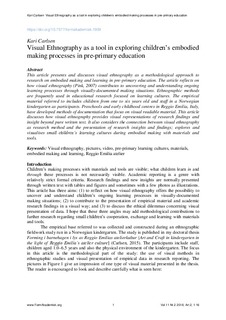Visual ethnography as a tool in exploring children?s embodied making processes in pre-primary education
Journal article, Peer reviewed
Published version

View/
Date
2018Metadata
Show full item recordCollections
- Institutt for estetiske fag [105]
- Publikasjoner fra CRIStin [3731]
Abstract
This article presentsand discussesvisual ethnography as a methodological approach to research on embodied making and learning in pre-primary education. The article reflectsonhowvisual ethnography (Pink, 2007) contributestouncoveringand understandingongoing learning processes through visually-documented making situations.Ethnographic methods are frequently used in educational researchfocused on learning cultures.The empirical materialreferred toincludes children from one to six years old and staff in a Norwegian kindergartenas participants.Preschools and early childhood centres in Reggio Emilia, Italy,havedeveloped methodsof documentation that focus on visual readable material.This article discusses how visual ethnography provides visual representations of research findings and insight beyond pure written text. It also considers the connection between visual ethnography as research method and the presentation of research insights and findings;exploresand visualisessmall children’s learning culturesduring embodied making with materials and tools. Visual ethnography as a tool in exploring children?s embodied making processes in pre-primary education
Description
Dette verket er lisensiert under Creative Commons Attribution 4.0 International License.
